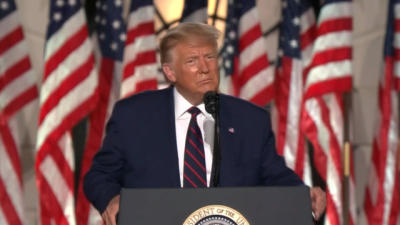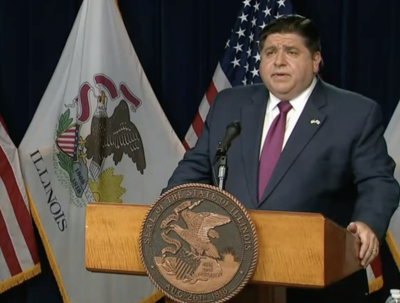Donald Trump goes maskless in Kenosha, and urges others to do so despite COVID-19 order

David Jackson, USA TODAY
,
USA TODAY•September 1, 2020

Scroll back up to restore default view.
WASHINGTON – No masks in Kenosha for President Donald Trump.
Trump, who has expressed off-again, on-again support for mask wearing during the COVID-19 pandemic, was maskless again Tuesday as he surveyed businesses damaged during protests in Kenosha, Wisconsin.
At the start of a roundtable meeting with law enforcement personnel, local officials, and business owners, Trump told them they could take off their face masks "if you feel more comfortable" doing so.
"Look how fast you took that off," he told one person.
None of the roundtable participants wound up wearing masks, a group that included Attorney General William Barr and Acting Homeland Security Secretary Chad Wolf.
Some members of Trump's entourage were seen wearing masks during a tour of torched areas in a state that has suffered its share of coronavirus cases. On Monday, the Wisconsin Department of Health Services reported 75,603 total positive coronavirus test results in the Badger State and a total of 1,122 COVID-19 deaths.
In late July, Democratic Gov. Tony Evers issued an order requiring all Wisconsin residents to wear masks indoors, except in private residences. The order "strongly recommends" face coverings outside "when it is not possible to maintain physical distancing."
Above is from: https://www.yahoo.com/news/donald-trump-maskless-kenosha-despite-193023242.html
*****************************************************************************************************************************************************
EMERGENCY ORDER #1 Relating to preventing the spread of COVID-19 by requiring face coverings in certain situations
WHEREAS, on July 30, 2020, I issued Executive Order #82, declaring a public health emergency to combat the uncontrolled spread of COVID-19 throughout the State of Wisconsin; WHEREAS, on July 26, 2020, the President’s COVID-19 task force recommended that Wisconsin consider adopting a statewide face covering requirement due to the increasing number of confirmed COVID-19 cases; WHEREAS, face coverings are a proven, effective way to slow the spread of COVID-19 without having a significant impact on people’s day-to-day lives; WHEREAS, the Centers for Disease Control (CDC) has called on Americans to wear face coverings, with the CDC director stating, “[c]loth face coverings are one of the most powerful weapons we have to slow and stop the spread of the virus – particularly when used universally within a community setting. All Americans have a responsibility to protect themselves, their families, and their communities”; WHEREAS, published scientific research has shown that the probability of transmission during exposure between a person infected with COVID-19 to an uninfected person is 17.4 percent if face coverings are not worn, and 3.1 percent if face coverings are worn;
WHEREAS, modeling by the University of Washington’s Institute for Health Metrics and Evaluation estimates that a face covering requirement in Wisconsin could save more than 500 lives by October 1 if 95 percent of Wisconsinites wear a face covering in public; WHEREAS, states across the nation have recognized the importance and effectiveness of face coverings, with 31 states implementing requirements for face coverings in different settings, including: Alabama, Arkansas, California, Colorado, Connecticut, Delaware, Hawaii, Illinois, Indiana, Kentucky, Louisiana, Maine, Maryland, Massachusetts, Michigan, Minnesota, Montana, Nevada, New Jersey, New Mexico, New York, North Carolina, Ohio, Oregon, Pennsylvania, Rhode Island, Texas, Vermont, Virginia, Washington, and West Virginia;
WHEREAS, Wisconsin must do its part to stop the spread of COVID-19 in the United States, which is leading the world in COVID-19 cases and deaths;
WHEREAS, COVID-19 is not only a threat to public health, but also to our economy; WHEREAS, widespread use of face coverings will slow the spread of COVID-19, allowing Wisconsin’s economy to move forward by making sure businesses can stay open and jobs are available; WHEREAS, all Wisconsinites are called upon to join in the collective effort to stop the devastating impact of COVID-19 by wearing a face covering, not harassing or threatening Wisconsinites who wear a face covering, and showing patience and compassion for those who are unable to wear a face covering safely;
WHEREAS, “Our Constitution principally entrusts ‘[t]he safety and the health of the people’ to the politically accountable officials of the States ‘to guard and protect.’” S. Bay United Pentecostal Church v Newsom, 140 S. Ct. 1613, (Mem)–1614 (2020) (quoting Jacobson v. Massachusetts, 197 U.S. 11, 38 (1905)); WHEREAS, Section 323.12(4)(b) of the Wisconsin Statutes authorizes the Governor to issue “such orders as he or she deems necessary for the security of persons and property” during an emergency; and
WHEREAS, based on input from state and local public health officials, medical professionals, and business leaders, I have determined that a statewide face covering requirement is necessary to protect persons throughout the State of Wisconsin from COVID-19. NOW, THEREFORE, I, TONY EVERS, Governor of the State of Wisconsin, by the authority vested in me by the Constitution and the laws of this state, and specifically Section 323.12 of the Wisconsin Statutes, hereby order the following:
1. DEFINITIONS. a. “Enclosed space” means a confined space open to the public where individuals congregate, including but not limited to outdoor bars, outdoor restaurants, taxis, public transit, ride-share vehicles, and outdoor park structures. b. “Face covering” means a piece of cloth or other material that is worn to cover the nose and mouth completely. A “face covering” includes but is not limited to a bandana, a cloth face mask, a disposable or paper mask, a neck gaiter, or a religious face covering. A “face covering” does not include face shields, mesh masks, masks with holes or openings, or masks with vents. c. “Physical distancing” means maintaining at least six feet of distance from other individuals who are not members of your household or living unit.
2. FACE COVERING REQUIRED. Every individual, age five and older, in Wisconsin shall wear a face covering if both of the following apply: a. The individual is indoors or in an enclosed space, other than at a private residence; and; b. Another person or persons who are not members of individual’s household or living unit are present in the same room or enclosed space. Face coverings are strongly recommended in all other settings, including outdoors when it is not possible to maintain physical distancing.
3. EXCEPTIONS. a. Individuals who are otherwise required to wear a face covering may remove the face covering in the following situations: i. While eating or drinking. ii. When communicating with an individual who is deaf or hard of hearing and communication cannot be achieved through other means. iii. While obtaining a service that requires the temporary removal of the face covering, such as dental services. iv. While sleeping. v. While swimming or on duty as a lifeguard. vi. While a single individual is giving a religious, political, media, educational, artistic, cultural, musical, or theatrical presentation for an audience, the single speaker may remove the face covering when actively speaking. While the face covering is removed, the speaker must remain at least 6 feet away from all other individuals at all times. vii. When engaging in work where wearing a face covering would create a risk to the individual, as determined by government safety guidelines. viii. When necessary to confirm the individual’s identity, including when entering a bank, credit union, or other financial institution. ix. When federal or state law or regulations prohibit wearing a face covering. b. In accordance with CDC guidance, the following individuals are exempt from the face covering requirement in Section 2: i. Children between the ages of 2 and 5 are encouraged to wear a mask when physical distancing is not possible. The CDC does not recommend masks for children under the age of 2. ii. Individuals who have trouble breathing. iii. Individuals who are unconscious, incapacitated, or otherwise unable to remove the face covering without assistance. iv. Individuals with medical conditions, intellectual or developmental disabilities, mental health conditions, or other sensory sensitivities that prevent the individual from wearing a face covering. v. Incarcerated individuals. The Wisconsin Department of Corrections shall continue to comply with COVID-19 protocols to ensure the health and safety of its staff and individuals in its care. Local governments are strongly encouraged to continue or create COVID-19 protocols to ensure the health and safety of their staff and individuals in their care.
4. LEGISLATURE AND JUDICIARY. State facilities or offices under the control of the Wisconsin State Legislature or the Wisconsin Supreme Court are exempt from this Order. The Wisconsin State Legislature and the Wisconsin Supreme Court may establish guidelines for face coverings that are consistent with the specific needs of their respective branches of government.
5. PRESERVATION OF MEDICAL SUPPLIES. To conserve limited supplies of N95 masks and other medical-grade supplies, individuals are discouraged from using such supplies as face coverings.
6. LOCAL ORDERS. This Order supersedes any local order that is less restrictive. Local governments may issue orders more restrictive than this Order.
7. ENFORCEMENT. This order is enforceable by civil forfeiture of not more than $200. Wis. Stat. § 323.28.
8. SEVERABILITY. If any provision of this Order or its application to any person or circumstances is held to be invalid, the remainder of the Order, including the application of such part or provision to other individuals or circumstances, shall not be affected and shall continue in full force and effect. To this end, the provisions of this Order are severable.
9. DURATION. This Order shall enter into effect at 12:01 am on Saturday, August 1, 2020. This Order shall expire on September 28, 2020, or by a subsequent superseding emergency order.
IN TESTIMONY WHEREOF,
I have hereunto set my hand and caused the Great seal of the State of Wisconsin to be affixed. Done at the Capitol in the City of Madison this thirtieth day of July in the year of two thousand twenty.
TONY EVERS Governor






